Metronidazole, commonly also referred to by its brand name Flagyl, is an antibiotic and antiparasitic medication often used in veterinary medicine. In this article, you’ll learn how it works, situations where it may be prescribed most often, potential side effects to monitor for, and some frequently asked questions.
Metronidazole for Cats Overview

- Tablets: Common human dosages include 250 mg and 500 mg tablets, which are adjusted for cats by a veterinarian.
- Liquid: Compounded for cats in appropriate concentrations (commonly 50 mg/mL or as specified by the veterinarian).
- Injectable: Dosage and administration depend on the cat's weight and condition.
- Tablets and unopened liquids generally have a shelf life of 1-2 years.
- Compounded liquids may have a shorter expiration, often around 30-90 days.
- Store as directed, typically at room temperature and away from moisture and light.
About Metronidazole for Cats
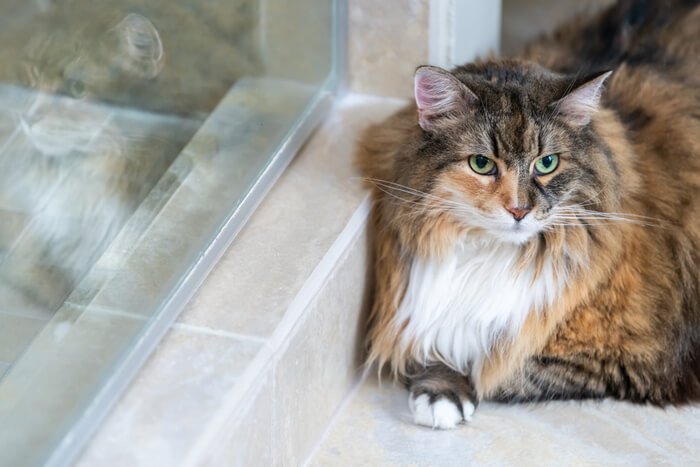
Metronidazole is an antibacterial and antiprotozoal agent.
As an antibiotic, it predominantly focuses only on a spectrum of bacteria called anaerobes, which are bacteria which require only limited oxygen, or no oxygen at all, to live. One of these bacterial types, Clostridium, is a common inhabitant of the digestive tract.
As an antibiotic, metronidazole is concentration-dependent, meaning it only kills bacteria if it reaches certain concentration levels within the body. While its method of action is not fully understood, it is thought to exert its activity against susceptible bacteria through disruption of their DNA synthesis.
Metronidazole is also an antiprotozoal medication. Protozoa are microscopic single-celled organisms. An amoeba for example, is a protozoan. There are many protozoa that are parasitic, with common ones in cats including Giardia species and Tritrichomonas foetus. While its method of action against protozoa is not well understood, it has been extensively documented as a therapy.
While not fully understood or well-documented, metronidazole is additionally thought to have some effect on cell-mediated immunity, a type of immune response that can lead to inflammation. Its use as an added therapy for inflammatory bowel conditions like inflammatory bowel disease is thought to be related to this property.
What Does Metronidazole Do for Cats?
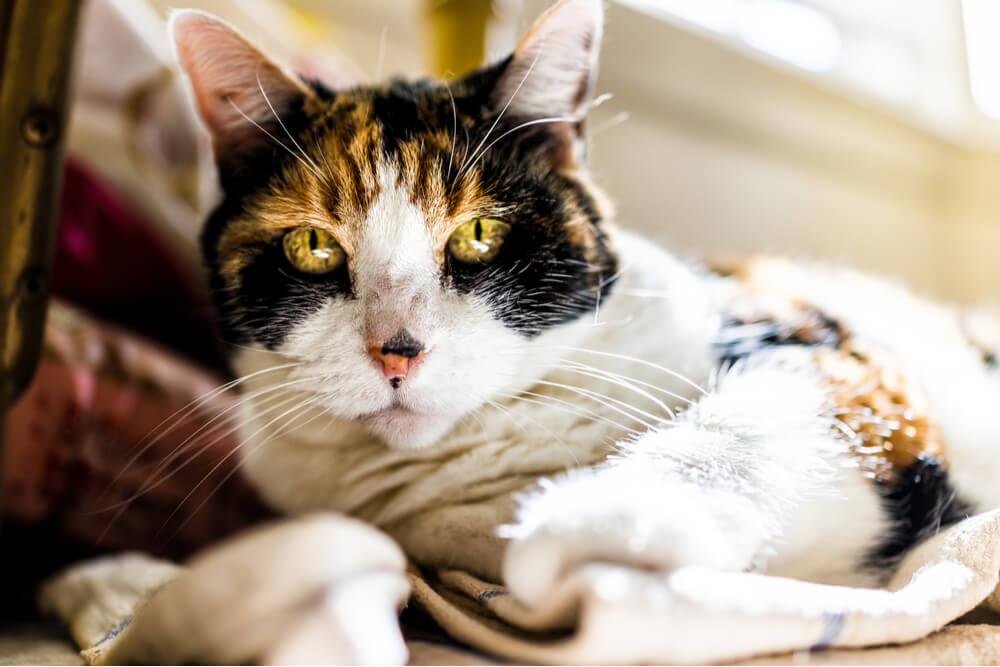
Metronidazole is used to treat bacterial and protozoal infections, as well as hepatic encephalopathy.
Metronidazole is most commonly known as an “anti-diarrheal†medication when used in veterinary medicine and is always used in an off-label manner in pets.
While there is no doubting its usefulness in many cases when treating bouts of diarrhea in pets, its mechanism of action for how it does this is not fully understood.
One of the most popular theories about why metronidazole addresses diarrhea is that it is actually treating small intestinal bacterial overgrowth.
The intestinal tract contains a wide variety of microorganisms, like bacteria, in a careful balance. Overgrowth of one group of bacteria, Clostridium for example, can lead to signs of diarrhea. A bacterial imbalance may occur as a result of diarrhea caused by another insult to the GI tract or it may be the primary cause of diarrhea.
In this case, metronidazole is thought to be killing overgrowth of anaerobic bacteria that may be causing bacterial infections, or otherwise contributing to the signs, like Clostridium. Clostridial bacteria do contain an enterotoxin that may cause intermittent signs of soft stool or diarrhea.
Another proposed mechanism of action for metronidazole’s efficacy in cases of diarrhea is the suspected, but poorly understood effect on cell-mediated immunity. This anti-inflammatory effect may help to calm bowel inflammation that is present.
Although metronidazole is often used empirically to treat diarrhea (meaning it is used as a treatment expected to show benefit even when the cause of disease is unknown), treatment of any condition like diarrhea will be best when the underlying cause is actually known.
This is why fecal samples are often sent out, even for indoor kitties, to rule out a common parasitic cause.
One of these parasitic causes can be the protozoan Giardia. Metronidazole can be used to treat protozoal infections caused by Giardia in cats, though it is often not the first choice. It is more often used alongside the preferred medication fenbendazole to help further reduce clinical signs and shedding of the parasite.
Another protozoan parasite, Tritrichomonas foetus, is sometimes seen as a cause of persistent diarrhea in cats, especially in kittens under 12 months of age. While it is not considered as ideal a treatment as ronidazole, many practices do not carry ronidazole commonly, so many cats may be at least started on metronidazole initially.
As suggested already, metronidazole may be used as an additional therapy for inflammatory bowel conditions, owing to its potential but not well understood effect on cell mediated immunity. Because inflammatory bowel conditions usually require long term treatment, extended use of metronidazole in this case does increase some risks of side effects.
Lastly, metronidazole may not only be used to treat infections associated with the GI tract. Anaerobic bacteria can also cause infections in other parts of the body as well. In severe cases, an injectable form of the drug may be used.
Side Effects of Metronidazole for Cats
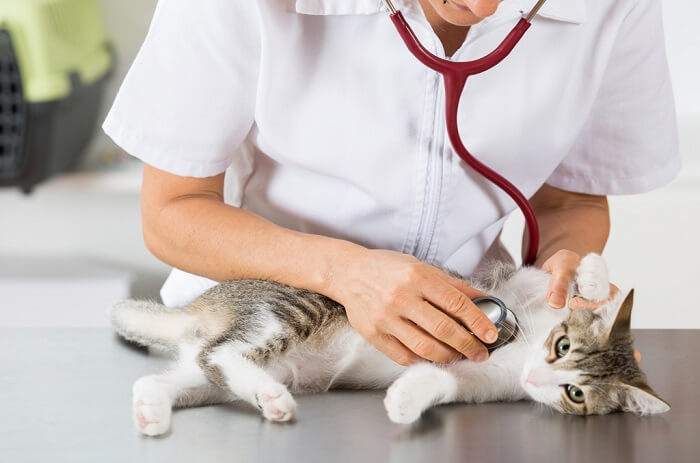
There are several side effects associated with metronidazole for cats. Due to the medication’s bitter taste, salivation is the most common side effect. Other adverse effects may occur, but they are rare.
Metronidazole is typically tolerated very well by cats as long as the dose is appropriate.
The most common side effects can include vomiting and inappetence. This may occur more often in cats owing to the bitter taste of the generic metronidazole tablet. If signs like these do occur, hiding the taste or having the medication compounded into a flavored tablet or liquid may overcome this effect.
At high doses or dosages continued for long-term periods of time, toxicity causing liver disease and neurologic toxicity signs may occur. This is usually not seen for short courses, such as for treatment of uncomplicated diarrhea, Giardia, or Tritrichomonas infections, but may become more likely with chronic courses, such as for inflammatory bowel conditions.
Metronidazole for Cats Dosage

The dosage for cats for metronidazole may vary depending on the purpose. Doses for general diarrhea may only be 5-10 mg/kg, but when treating specifically for Giardia or Tritrichomonas foetus are typically much higher.
For this reason, it’s very important to only use metronidazole as prescribed by your veterinarian.
In some cats, especially smaller kittens, the commercially available tablet sizes may be too large to provide for safe or practical dosing, making compounding the medication into very low dose tablet or liquid formulations at a compounding pharmacy more feasible.
Conclusion
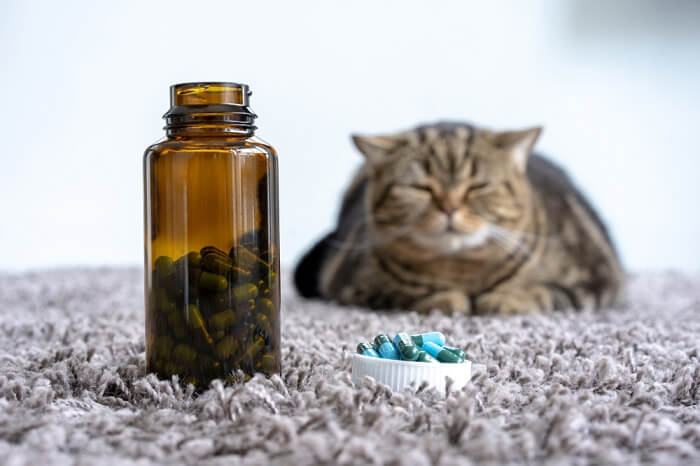
Metronidazole is a very commonly used medication in veterinary medicine. With antibiotic and antiprotozoal properties, it is often used to treat various causes of diarrhea in cats, but can be used for other types of infections.
Side effects can occur, but are usually seen much more with higher doses or prolonged courses of the medication. As with any antibiotic medication, it is always important to finish out a complete course as prescribed by your veterinarian and to never use it without discussing first with your vet.
Drug Dosing Disclaimer: We are only able to provide doses for medications that are FDA approved for use in cats and only as the label guidelines dictate. For medications that are used off-label we can only provide guidelines and safety information for use. Safe and appropriate dosing for off-label medications can only be determined by a primary care veterinarian.
We encourage you to work with your veterinarian to determine if a particular medication is appropriate for your cat. Changing or adjusting a dose for your cat on your own without consulting with a veterinarian can carry risk. We do not encourage use of medications prescribed for human use in pets without first consulting with a primary care veterinarian.
Frequently Asked Questions:
Does metronidazole make cats tired?
As mentioned, metronidazole toxicity can cause central nervous signs, that can include dullness, so if your cat seems tired when on this medication, you need to discuss this with your veterinarian.
How much metronidazole do I give my cat?
This is a decision for your veterinarian, but generally the dose rates recommended above will be used.
What is Metronidazole Used for in Cats?
Generally, metronidazole is most often used in cats to treat for a variety of causes of diarrhea. Specific causes may include targeting overgrowth of toxin-producing intestinal bacteria like Clostridium and the stomach bacteria Helicobacter pylori.
While it is sometimes used to treat the protozoal parasites Giardia and Tritrichomonas foetus, it is usually a secondary preference to other medications used for those diseases, which are more effective.
Owing to its not-well-understood ability to inhibit cell-mediated immunity, metronidazole may also be used in some cats as an added treatment for inflammatory bowel conditions.Â
How Long Can a Cat Take Metronidazole?
Most courses of metronidazole are shorter, for 1-2 weeks duration. Veterinarians may sometimes use it for longer, especially for cases of refractory diarrhea that appears to respond to metronidazole treatment.Â
While there is no defined limit for how long a cat can stay on this medication, there is a possibly increased risk of neurologic or liver toxicity effects over time with prolonged chronic use of months to years.Â
As with any medication, a balance always needs to be struck between benefits that the medication has for the signs and condition being treated, and any emerging or present side effects.Â
Why Do Vets Prescribe Metronidazole?
Vets often prescribe metronidazole as an empirical treatment for diarrhea in cats. While determining the cause of diarrhea with fecal and/or blood testing is ideal so that the best most specific treatment is used, testing beyond a simple fecal for intestinal parasites may become cost-prohibitive for some cat parents (fecal PCRs, cultures, etc.).Â
By contrast, metronidazole is very inexpensive and many veterinarians may use it to treat conditions empirically as long as the signs improve and no adverse effects are seen.Â
There are other specific cases, such as with Tritrichomonas or Giardia infections where metronidazole may be prescribed as a part of therapy.Â
Can You Mix Metronidazole with Wet Cat Food?
Metronidazole is a very bitter-tasting tablet medication, meaning that it may be difficult to give to your cat without somehow hiding the taste.Â
Generally, it is okay to hide it in a portion of canned or wet food or a medication administration treat, like a Pill Pocket. As long as a tablet is not enterically coated, it can be broken up into smaller pieces and mixed with a small amount of soft food.
However, when mixing with food, it is important to remember that even when broken up into pieces, the medication needs to be ingested all at once. Make sure to mix with a small portion of food that your cat will consume in one sitting, for the best expectations.
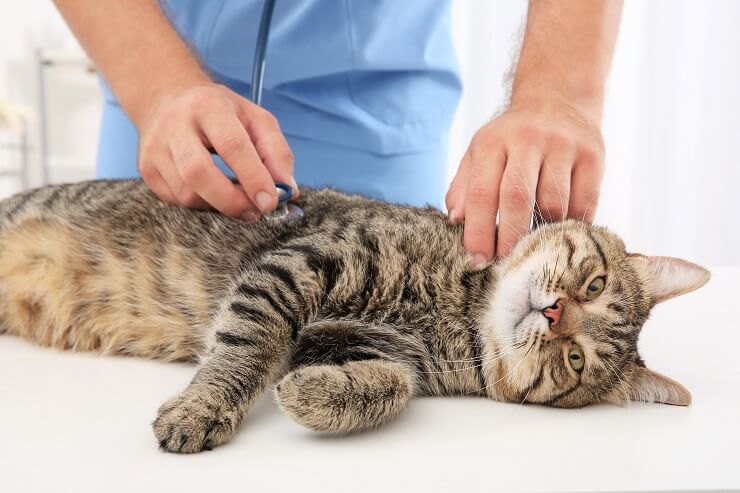








Can I crush the pill and mix it with wet food?
It is not recommended that metronidazole tablets are split or crushed, but there are several formats that may make it easier to administer. For example, metronidazole benzoate is a compounded formulation that tastes better to cats. Alternatively, if your cat absolutely will not accept it, you can consider an injectable format to be given by your vet. Wishing you and your cat all the best!
Could it be the lack of food or it the pill have gotten stuck in her oesophagus. I did t know you were supposed to rub their throat after or syringe water
My cat died after I gave her metronidazole. She was prescribed 50mg capsules twice a day after one about of vomiting and pooing what looked like mostly blood. I couldn’t get her to eat, but the vet said to give it to her always and syringe feed her. The appetite pill didn’t work. After the third does she she drooling a lot. I looked it up and it was a side effect. I was scared but I thought it’s listed online it’s normal. I gave her the pill right before sleeping and wake up 7 hours later to a cat on deaths door. We rushed her back to the emergency vet and we’re told to put her down. I am worried that I killed her by giving her 3rd does just about 2 hours early. She was given the first does at 1-1:30am that morning at the emergency vet, the next at 1pm and the third at 11:45pm. I thought that it’d be fine as it was close and I was exhausted. She was unable to walk in the morning, which is a sign of overdose. Did I kill her?
I am really sorry to hear that your cat passed away. This was definitely not due to your actions. A typical cat weighs 4 – 5kg, and the dose of 50mg per cat twice a day is therefore 10 – 12mg/kg which is at the low end of therapeutic ranges. It does not matter at all that you gave this dose early. Margins are just not that tight or important. And also, you would have seen other signs if the pill had got stuck in her esophagus. It is most likely that there was some sinister reason for the vomiting and passing of blood, and this is why she passed away. The only way to know for sure would be to have an autopsy carried out, but this is not always easy or possible or affordable. Please be assured that her death was nothing to do with your actions. You definitely did not kill her. Take care. Pete
Hi, I have a 14 yo cat who is on her 2nd course of metronidazole for diarrhea but it’s not working. The vet did blood work at our last visit but nothing looked suspicious. Any ideas or suggestions as to what could be going on before I schedule another vet visit. Thank you.
Hi Shannon – there is a long, list of possible causes of diarrhea in an elderly cat, including inflammatory bowel disease Please read this article to find out more.
The only way forwards is to back to your vet to continue the process of finding out what this is, and what might then help.
Sorry not to be able to help any more.
Pete
Is the fish tank version of metronidazole the same thing? Can you give the fish version, in the proper dosing of course, to an animal?
Yes, the antibiotic metronidazole is the same chemical, but the fish tank version is a different formulation to the cat, dog and human versions, meaning that absorption into the bloodstream is not likely to be predictable. The use of the fish tank version in mammals would not be recommended.
The vet prescribed 100 MG twice dayley for my 3 year old cat that weighs 15 pounds, for 7 days. Is that to much for my cat to be taking? What is the recommended dosage for a cat that weighs 15 pounds?
I would go with your veterinarian’s recommendation. This sounds like it’s close to the upper end of the dosing spectrum (25 mg/kg of bodyweight) but not at all unusual.
I took my ill kitty to an emergency animal hospital. They weighed her and said she weighed 12.5 lbs, which is less than 6 kg. After an extensive exam, they didn’t find anything to explain her diarrhea and weight loss but prescribed 62.5 mg of Metronidazole, twice a day for 14 days. That’s 120 mg per day which sounded like a lot for a small cat. They gave her the first dose at the clinic and by the time we got home (45 min. away) she was lethargic, her eyes rolled back in her head, she couldn’t hold her head up, she couldn’t stand up and her pupils were dilated. I called them and the veterinarian who treated her said Metronidazole doesn’t do that to cats. Maybe it doesn’t if you don’t overdose them. That vet said I could cut the dosage in half but I didn’t give it to my girl again. Well the problem isn’t resolved and the usual vet wants to give her Metronidazole again. You can bet we will have a really long discussion before I dose her again. Maximum is 7.5 to 10 mg per kg from what I read on multiple vet sites and the drug manufacturer’s site. The cat now weighs less than 5 kg and I will be very wary of just doing what a vet says without checking it out myself. Just like I am with my own medications.
Be careful. It appears our 3-month old kitten is suffering metronidazole toxicosis. She had horrible seizures yesterday and had to be hospitalized. She needed diazaprem to stop the seizures. Right now she is resting at he vet. We are praying she recovers. Our kitten was on metroninidozale for 1 week.
Hi Ethan, apologies for the late reply. I hope that all is well with you and your kitten.
Metrogel is listed in the brand names. Can metrogel be used as a transdermal for cats to get rid of giardia.
Hi Sue, apologies for the late reply! I’d recommend asking your veterinarian if this is an appropriate application of Metrogel. Thank you!
I have a 5 weeks old kitten is this medication safe for him to take
Metronidazole must be used with caution in kittens, so I would consult your veterinarian.